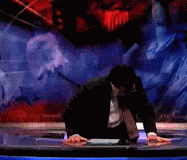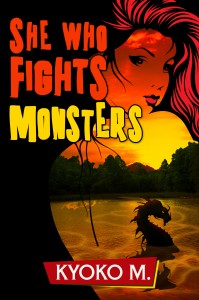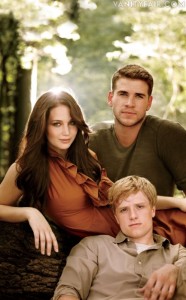
Pictured: the most adorable man in all of late night TV. No offense, Craig Ferguson.
It’s a dark time in America because everyone’s favorite political satirist pundit, Stephen Tiberius Colbert, is ending his show December 18, 2014. The good news is that he’s ending the show in order to take over David Letterman’s late night talk show, but it does mean saying goodbye to the character of Stephen Colbert. In his honor, here are some things that his show has taught me since I began watching back in 2008.
Go big or go home. Everything about Colbert is always big, loud, and over-the-top. Last night took this idea to new heights when he had the President of the United States, Barack Obama himself, appear on the show and not only give a great interview, but actually take over one of Colbert’s most famous segments, The Word (changing of course to The Decree because he’s the goddamn president.) Colbert does nothing in moderation, and it’s one of the reasons why he’s been charging past Jon Stewart in terms of notoriety. He’s had a plethora of amazing guests, absolutely hysterical interviews, several historical impacts on pop culture (he has his portrait in the Smithsonian, he’s had newly discovered species named after him, and even has a treadmill in the space station named after him), and he never lets himself be bested. One of his more famous moments was after he was scheduled to interview Daft Punk and they canceled on him last minute, he then launched into a musical bonanza cover of their smash hit “Get Lucky” with a ton of guests like Bryan Cranston, Matt Damon, and Jimmy Fallon just to stick it to Daft Punk and MTV for snubbing him.
Colbert’s example is applicable to writing in that it’s important not to half-ass anything in your work. If you’re afraid of a certain subject, then either charge forward full steam ahead or don’t do it at all. Often I’ve read stories where characters are wishy-washy or you can tell the author wants to bring something up, but they can’t find it in themselves to make a decision. This trait happens most often with romantic couples in fiction, like Ross and Rachel from Friends, where the writers are indecisive about a relationship or think they should drag it out as long as possible to keep the audience’s interest. Being decisive in writing is essential to keep your readers’ attention and to put your highest quality of work on the pages instead of fretting over things you feel like you should avoid. Be bold. Be fearless. If you’re going to go there, don’t just go there—go there, buy a t-shirt, take a selfie, and post it on Facebook.
The character is not the same as the author, and vice versa. One of the most consistently stupid things associated with the Colbert Report is that some people don’t realize he is a parody character. There have been so many times where I’ll see a post of someone ranting about Colbert’s ignorance and offensive opinions like he is a real person and not political satire. It’s probably the same idiots who fall for the fake news headlines that The Onion makes every day, but I digress.
Stephen Colbert and Stephen Colbert are not the same guy. When the camera’s on, we get a hilariously rigid conservative who trusts only his gut and anything that his idol “Papa Bear” Bill O’Reilly has to say. Off-camera, though, Stephen is actually a nice, fiercely intelligent husband and father. When he’s not on the Report, he often gives speeches (like the famous 2006 White House Correspondent’s Dinner) and is a social and political activist. He truly does believe in the people and he wants the best for us, so it’s important that people realize that he is playing a character and there is a separation between the two men that he is.
A lot of authors, especially female authors, get flack for something their character does that the readers disagree with, so it’s important to acknowledge that writers are artists. We craft stories. That doesn’t mean we condone everything that happens in them unless it’s expressed in our blog or social media. It can be hard to make that distinction when you’ve spent a whole novel getting to know their characters, but good authors make it clear in their work that it’s the character’s decisions that drive the narrative, not their own agendas. It’s always easy to tell when the author wants something to happen instead of it happening naturally in the context of their own world because it feels forced, like an invisible hand turning the page for you rather than letting you get there on your own. It may take a while to learn how to let the story flow, but it’s worth it.
Challenge authority. One of the reasons I like Colbert better than Jon Stewart is that he’s more balanced. He’s a parody of conservatives, but he also makes fun of everyone in every political party instead of just heaping contempt on one side of the fence. Hell, some of his best lines have been over-the-top shots at President Obama (I once recall him accusing him of being a “time-traveling Muslim terrorist.”) Everyone is open season when it comes to Colbert, even his own network and sponsors, and that’s how it should be. He isn’t afraid to criticize the powers that be and bring up excellent commentary on unfair policies, hypocritical pundits, lousy news reporting, and questionable or unethical behavior by those who run this country.
This is also absolutely important in the world of writing, both in fiction and non-fiction. One of the reasons why The Hunger Games is so popular is because it boldly criticizes some of the things that are happening in our society today, from revolutions and war to the way the media is so willing to cover up horrible crimes by distracting its audience with a forced love story. The films are also unnervingly prophetic, as advertisers have been trying to force every sort of product you can imagine out of the franchise. Subway had a tagline for Catching Fire, “Where victors eat” that made me want to tear my hair out because it was ludicrous considering the story is about starving children forced to murder each other so their families won’t die. Sure, that lends itself perfectly to a five dollar footlong. Or how ABC Family just started running the first movie on their channel; you know, the channel most parents used to be able to leave on for their kids because the material was family friendly. Yes, please show children violently killing each other thanks to a totalitarian government to my six year old. Brilliant marketing.
Anyway, The Hunger Games challenges the government’s tendency to manipulate everything we see for their own purposes, and that is definitely the truth not only in America, but in every country. Authors should never be afraid to speak up about injustice, even if it’s not as overt as The Hunger Games trilogy.
It also doesn’t have to stick to politics. A lot of self-published authors have been rising in the bestsellers ranks and making a point to the Big Six publishers that they aren’t the only way to go in the publishing world. Too many companies still look down on indie authors, and while neither method of publishing is better than the other, it should be seen as a fair trade. Both ways have benefits and consequences, but right now, traditional publishing is still seen as being more ‘legitimate’ while many indie authors are stuck underneath a glass ceiling. The tension between the two will probably dissipate years from now, but until then, authors need to ask questions and search for facts and be unafraid to get answers.
Fact checking is your friend. How many jokes per segment of any given Colbert Report episode is devoted to showing a politician who has zero facts and yet feels qualified to give their opinion on a current event? Go ahead, guess. I’ll wait. It’s impossible to tell because thanks to the 24-hour news circuits, pundits, interviewers, celebrities, and politicians are constantly letting the most ignorant statements and opinions fly out of their mouths with no regard for research, mathematics, or facts. At some point, journalism was about finding the truth and sharing it, but too many news channels are concerned about ratings and sensational news, so they let simple facts fall to the wayside. The good news is, though, The Colbert Report is there to make fun of them to the ends of the earth.
Research is tedious. There is nothing that can change that, not even Wikipedia. But it’s not just necessary if you’re an author—it’s mandatory. No matter what kind of story you write and no matter what the genre, you will need to do research. If you write epic or high fantasy, sure, the proportion of research might be smaller, but it is 100% mandatory to do research before you publish any work. If you don’t have a notepad, Word document, or slab of concrete full of notes that have been fact-checked by an academic source, then don’t you dare hit that Publish button. Nothing is worse than reading a book and being able to open a tab in your Internet browser and immediately prove that what happened was false or wildly inaccurate. Some readers don’t mind if the truth is bent or slanted, or if your work is based on theory, but if you expect them to pay for your work, you need to have actually done it. Otherwise, the critics will come after you with torches and pitchforks and you’re done for.
Trust your gut. One of Colbert’s biggest achievements was the creation of the word “truthiness” (which was officially added to the Webster’s Dictionary, to my endless amusement): “the quality of seeming or being felt to be true, even if not necessarily true.” Colbert insists that he doesn’t need facts because he asks his gut whether something feels true or not. While amusing, he does have a point.
An author’s instincts are key in determining where they are going to go with a particular story, and where they are going to go in their career. There are so many possibilities involved with this career that they can get overwhelming, and some find themselves panicking over choices to make. Take it from Colbert. Trust your gut. Trust the strongest, loudest voice in your head as long as it lines up with what you feel in your gut. This may mean taking a huge risk with a character or a story arc. This may mean deleting one of your favorite scenes or erasing a character out of the narrative. It can mess up what you thought you wanted, but if it makes your work better, then you are bound by authorly honor to do it. If it feels true to the story, then do it. Accept no substitutes.
It’s going to be hard to say goodbye to Colbert after so many years of laughter, but all good things must come to an end. Here’s to you, Colbert. It’s been real.
-Kyoko



